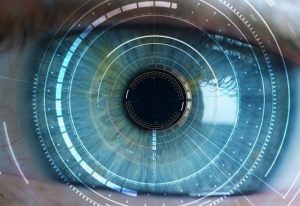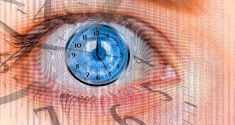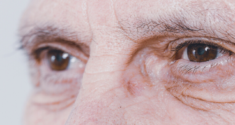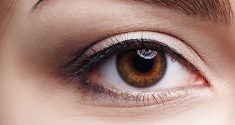Exciting new research conducted by a team of researchers led by Purdue University College of Agriculture biochemistry associate professor Vikki Weake offers fresh insight into the links between a healthy circadian rhythm and eye health and function as we age. According to the results of this new study, published in PLOS Genetics, the circadian clock protects eyes as they age, perhaps even serving to delay certain types of age-related vision problems.
Funded in part by the National Eye Institute of the National Institutes of Health (NIH), the study used Drosophila fruit flies, a common choice due to certain mechanical and functional similarities between the eyes of these flies and human eyes.
Circadian Rhythm and Eye Health
 Through decades of research, scientists have discovered that the health and functioning of the circadian rhythm and the eyes are deeply intertwined. For example, the eyes have a strong influence over the health and functioning of the circadian rhythm because light is the most powerful environmental cue for the circadian rhythm. Our retinas have specialized retinal photoreceptors that relay light information to the suprachi-asmatic nuclei (SCN), located in the hypothalamus, thereby setting the timing of our inner master clock and overall circadian rhythm. This is a critical process, influencing the timing of countless essential processes throughout brain and body, impacting overall health and functioning on multiple levels.
Through decades of research, scientists have discovered that the health and functioning of the circadian rhythm and the eyes are deeply intertwined. For example, the eyes have a strong influence over the health and functioning of the circadian rhythm because light is the most powerful environmental cue for the circadian rhythm. Our retinas have specialized retinal photoreceptors that relay light information to the suprachi-asmatic nuclei (SCN), located in the hypothalamus, thereby setting the timing of our inner master clock and overall circadian rhythm. This is a critical process, influencing the timing of countless essential processes throughout brain and body, impacting overall health and functioning on multiple levels.
The circadian rhythm, among many other timing-related tasks, helps to regulate the sleep-wake cycle. The timing of melatonin production, which typically takes place as daylight fades into the dark of night and can be disrupted by bright artificial lighting in the evening, is also linked to the circadian rhythm and the sleep-wake cycle. Melatonin levels and circadian rhythm disruption have been linked to certain vision problems, including glaucoma and myopia, or nearsightedness.
Melatonin has been associated with eye health in a number of ways, including its neuroprotection, anti-inflammatory and antioxidant actions, and is being closely studied for its potential in the treatment of a variety of eye diseases. These are just a few of the ways that circadian rhythm health can impact eye health.
How the Circadian Clock Protects Eyes During Aging
According to the results of the recent Purdue University College of Agriculture study, the circadian rhythm plays a critical role in maintaining the health and function of our eyes as we age. That is because it is responsible for the timing of the processes involved in the repair and rebuilding of light-sensing proteins and other elements involved in the mechanics of how our eyes function. Circadian rhythm disruption can interfere with these essential repair processes. Once those repairs get behind, no longer keeping up with the daily wear and tear, so to speak, it can lead to retinal degeneration, assorted age-related eye conditions and other eye health and function issues.
Protecting the circadian clock through maintaining a healthy circadian rhythm helps to keep up with the nightly repair needs of the mechanical components essential to eye function. In addition, a healthy circadian rhythm helps to properly regulate the timing of the production of hormones such as melatonin, and other critical chemical interactions impacting eye health.
Maintaining Circadian Rhythm Health
In our well-lit, open-24-hours modern world, maintaining circadian rhythm health can be a challenge. While we all appreciate the brightness and ease of artificial lighting, to maintain a healthy circadian rhythm, we need to be more mindful of how we use it.
Limit bright light usage in the evening, especially during the two to three hours before bedtime. That does include mobile phone, tablet and computer use. Bright lights and the blue light emitted by our devices and LED lighting can delay melatonin production, thus disrupting sleep timing and the circadian rhythm.
Increase morning sunlight exposure and try to get more natural light exposure throughout the day, including spending a few minutes outside around sunset as natural light fades. Make sure to get enough physical activity daily. Set a sleeping and waking schedule, getting up and going to bed at the same times every day, including days off. Include evening wind down, relaxation routine before bedtime, including activities specifically targeting stress, such as meditation or a warm bath.
Meal timing also influences your circadian rhythm, so try to eat your meals at the same time each day. Consume the bulk of your calories at breakfast and your midday meal, choosing a lighter evening meal more focused on healthy protein, vegetables and fruit than carbohydrates.
Embrace Your Natural Rhythms to Protect Eye Health

To promote better eye health as you age, embrace more natural, circadian rhythm affirming natural rhythms. Be mindful of the timing of light exposure. Be active during the day. Plan calorie consumption to fuel those activities. Prioritize your sleep, allowing essential eye health processes to take place.







